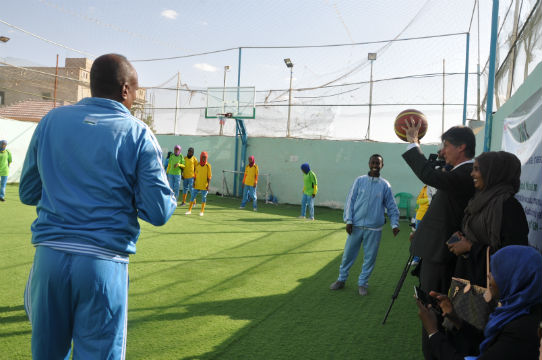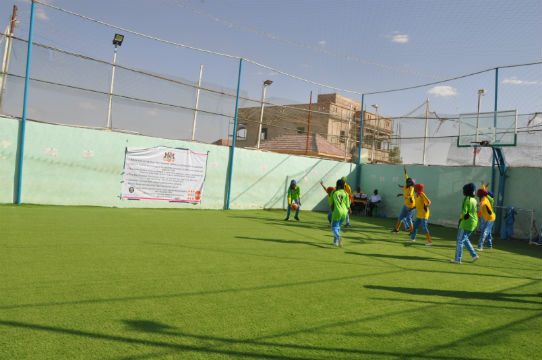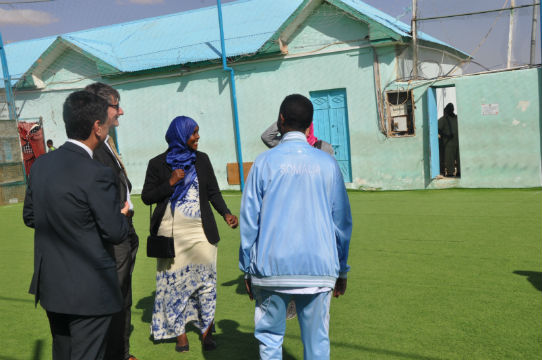Female basketball players in the Puntland State of Somalia are raising their voices in support of the campaign towards total abandonment of Female Genital Mutilation (FGM).
Basketball for females is completely a new phenomenon in Somalia as sports for women in the country has since the civil war in 1991 been considered a taboo and culturally insensitive. Somalia’s prolonged civil war resulted into a shattered sport infrastructures but also created a difficult environment for female sports and lack of acceptance by certain religious groups who argue that sports is immodest and that Islam does not allow women to play sports, or to wear shirts and pants.
However, as sports is bouncing back, girls playing games including basketball, have taken up the campaign and advocate against FGM, chant and sing songs against the practice during the games.
The Ministry of Labor, Youth and Sports in Puntland officially launched the first-ever female basketball tournament on 6 September in support of the FGM campaign. The tournament was sponsored by UNFPA with funding from the Government of Finland and the launching ceremony was attended by officials from the Embassy of Sweden who are co-funding UNFPA’s programs in Somalia.

UNFPA representative at the launch of the tournament
Speaking at the launch of the tournament UNFPA Somalia Representative Mr. Nikolai Botev commended the Ministry of Labor, Youth and Sports for being innovative in taking the FGM campaign to sporting activities.
“Basketball is attracting a lot of attention among the youth and it is therefore a good channel for communicating important messages such as the dangers that FGM causes,” said Mr. Botev.
FGM is known to have serious health problems affecting the reproductive health of women and girls. It results in immediate physical problems, for example, intense pain and/or hemorrhage that can lead to shock during and after the procedure. FGM also leads to long-term complications like painful or blocked menses, recurrent urinary tract infections, dermoid cysts, and hardening of scars, infertility and also increases the risk of HIV infection.
Somalia is one of the countries with the highest rates of FGM with a prevalence of 98 percent. The most common type involves cutting the genitals then sewing them closed, which can cause significant and long-lasting harm. UNFPA partners with the government, health workers, local organizations, as well as religious leaders and youth activists to encourage their community and policymakers to abandon the practice.
Basketball coach Ms. Fawsia Abdi said the initiative for engaging female basketball players in the fight against FGM is equipping girls including those marginalized with skills on becoming change agents and engaging them in decision making processes particularly those affecting their sexual reproductive health.
“Sports is a good tool for peace building and for creating an enabling environment for young people including girls to realize their potential and talents,” said Ms. Abdi.
The FGM advocacy programme through basketball does not only focus fitness and training for basketball but only also offers a life skills training where young girls receive sessions on gender equity and equality and prevention and response to Gender Based Violence (GBV).
Ms. Hawo, one of the basketball players, said she feels proud to see the international community and Puntland authorities encouraging females to participate in sporting activities and be part of the fight against FGM.
“The sport is not only about fitness and becoming stars but it is also helping us realize our inner strength as young women so that we don’t feel segregated,” said Ms. Hawo.

Rival teams battle it out during the FGM basketball tournament
As the final whistle of the tournament was blown on 7 September, Garowe City Players emerged the overall winners within the shiny basketball court of Jawle Stadium. Shouts and cheers plus chants and songs against FGM filled up the place.
“I am so excited today and I can’t describe my feelings in words. We didn’t only beat our main contenders Nugaal Stars but we also beat the monster named FGM and we will continue on this quest until we totally shatter it. We want to ensure that the health of all girls is no longer compromised” said Fadumo, basketball player for Garowe City Players.
Although Somalia has one of the highest rates of FGM especially among older women, some studies are showing a decrease of the prevalence among younger girls, but still attitudes towards zero tolerance to FGM practice remain a concern in many parts of Somalia and in Puntland in particular.

Swedish Embassy officials and UNFPA interacts with coaches
Puntland has since put in place legal frameworks towards FGM abandonment. In 2014 Puntland approved a zero tolerance FGM Policy to ensure harmonization of government agenda with regard to advocacy against FGM. In addition to this, the Puntland Ministry of Health issued an anti-medicalization strategy stopping health practitioners to perform FGM. However, full implementation still remains a challenge.
Today, a greater number of countries have outlawed the practice, and an increasing number of communities have committed to abandon it, indicating that the social and cultural perceptions of the practice are being challenged by communities themselves, along with national, regional and international decision-makers. Therefore, it is time to accelerate the momentum towards full abandonment of the practice by emphasizing the human-rights aspect of the issue.
---Bahsan Said
###
For more information, please contact:
Ms. Pilirani Semu-Banda, Communications Specialist, UNFPA Somalia, Tel: +254 734500439; semu-banda@unfpa.org

